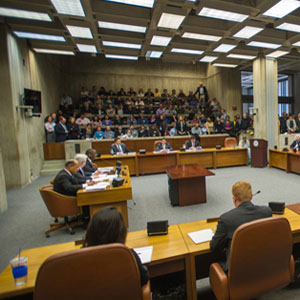During spring break last March, when many students were sunning themselves on beaches or catching up on sleep, Max Wallack traveled
to Los Angeles to deliver a poster presentation at the American Association for Geriatric Psychiatry’s annual conference. His subject was the role of ACE inhibitors—a class of drugs used to treat cardiovascular disease—in preventing Alzheimer’s disease. Heady stuff, especially when you consider that Wallack, now a BU junior, was just 16.
For the past two years, Wallack has been working in the Laboratory of Molecular Psychiatry in Aging at BU’s Alzheimer’s Disease Center (ADC). Several days a week, he dons a white lab coat and investigates the role of certain enzymes in the early stages of Alzheimer’s and the potential effectiveness of a diabetes drug already approved by the Food and Drug Administration in treating the memory-robbing disease that afflicts nearly five million Americans.
“Alzheimer’s is a disease that has to be fought on multiple fronts,” says Wallack (CAS’15). “You can’t just fight it with drugs, because these drugs aren’t helping patients with their emotions. You need to make them feel like they are valuable people and that they can accomplish things.”
Wallack knows all too well the devastating impact the disease can have on patients and their families. When he was six, his great-grandmother, Gertrude Finkelstein (“Getgrams”), lived with him and his parents after she was diagnosed with Alzheimer’s. The two had been inseparable since he was born and remained close, even as the disease ravaged her mind.

Max Wallack (CAS’15) with his great-grandmother, Gertrude Finkelstein, who died of Alzheimer’s disease when he was 10 years old. Photos courtesy of Max Wallack (2)
“She couldn’t remember who she was; she didn’t know that my father was my father and not her husband,” Wallack says. “She didn’t know who anybody was. But she always remembered me. Even two days before she died, when she couldn’t remember anyone else, she still knew me.”
Shortly after his great-grandmother’s diagnosis, he set out to find ways to make her life easier. At six, he created what he calls his “great-granny booster step”—a wooden step that made it easier for her to get in and out of the family minivan.
During her hospitalizations, Wallack noticed the number of Alzheimer’s patients who were working on puzzles. In 2007, he started researching the role that puzzle-solving plays in helping patients, and he discovered that it not only boosted their self-esteem, but also helped slow the disease’s progression.
With that in mind, he started collecting jigsaw puzzles in and around his hometown of Natick, Mass., and donating them to local hospitals and care centers. He filled his garage. A year after his great-grandmother’s death, in 2007, he launched a nonprofit, Puzzles to Remember, which supplies free puzzles to patients. Next, he started writing to puzzle manufacturers to see if they could help. One of them, Springbok Puzzles in Missouri, immediately sent some boxes, starting an ongoing collaboration.
At Wallack’s request, Springbok took images that were popular with its adult customers and created easy-to-do puzzles of 12 and 36 pieces. The company now offers a puzzle line specifically for Alzheimer’s patients, and has donated more than 1,000 puzzles to Puzzles to Remember. Wallack has worked with Springbok on the line, offering advice about the kinds of images and the number of pieces. He estimates his charity has given more than 22,000 puzzles to over 1,800 institutions in the United States, Canada, Mexico, England, France, Israel, South Africa, and Colombia.
While a student at Boston University Academy, Wallack began earning national recognition and cash prizes for his work as an advocate for Alzheimer’s patients, including $2,500 from the Build-A-Bear Workshop Bear Hugs Foundation in 2009. He has donated at least half of the money to institutions that help Alzheimer’s patients. By that time he also knew what he wanted to do with his future: college, followed by medical school and a career as a geriatric psychiatrist.

Max Wallack’s nonprofit, Puzzles to Remember, has distributed more than 22,000 puzzles to Alzheimer’s patients in the United States and abroad.
In 2010, Wallack, then 14, spent the summer photocopying and filing in the Alzheimer’s Disease Center. A short time later, he met Wendy Qiu, a geriatric psychiatrist in charge of the ADC’s Laboratory of Molecular Psychiatry in Aging. Qiu, a MED associate professor of psychiatry, showed him around her lab and told him about their work identifying biomarkers to help diagnose early-stage Alzheimer’s. Wallack was transfixed. He was determined to join her lab, but had to wait until he was 15, the minimum age for a person to work in a locked laboratory.
Wallack has never let his age stand in the way. He completed kindergarten and first grade at the same time, skipped fifth grade, and completed more than a year of BU courses while still attending BU Academy.
“Every three months, Max emailed me and said, ‘Dr. Qiu, I still want to come to your lab. This is my plan when I turn 15. I hope you agree with that,’” recalls Qiu. Her staff was skeptical, but they found Max a quick study who took criticism well and wasn’t afraid to make suggestions.
Now a neuroscience major at BU, Wallack says he plans to earn an MD and possibly a PhD, so that he can care for patients and their families and pursue laboratory research. “I would like to be somebody who is in charge of really helping combat this disease,” he says. “This is what I want to focus my life on.”


















































Max, thank you for helping these people. I have Lyme disease and have hundreds of friends with tick-borne diseases. Prevent Lyme disease by doing tick checks. I started my first jigsaw puzzle 3 weeks ago and it helped me to focus and it relaxed me. Lyme disease gives lesions to your brain. Thanks for what you are doing, Jan
This is a fabulous story for both Max and BU! He harks back to BU in the 60’s-the compassion and activism and he has genius! I’d like to let Max know that this old BU SON Class of ’69 grad continues to work with many of the same folks-in frontier NM-and helps run a Care for the Caregivers group in a local LTC facility. We always have a “bed and a bean” for this amazing fellow alum! Thank you!
What an amazing young man. He has such wonderful motivation to help the victims of such a devastating disease. He will follow his dreams, and I’m sure we will hear of his accomplishments in the future.
Max, keep up the terrific work you are doing to eradicate a horrific disease. Your kindness and caring are to be admired. We look forward to hearing great things about you in the future.
Max, you are an amazing young man, and as a little boy, you created a bond with your Getgams that brought tears to my eyes. Kudos to BUA for their commitment and insight into a disease that steals our loved ones in the most horrific way. In all the ALF’s I go into, when children are in the mix, I see smiles on faces that usually have a flat affect. I’m so proud of you Max. Continue the fight.
I want to thank Boston University for their full support of this young man and his quest against Alzheimer’s disease. I can’t get over how he accomplished so much at a young age, and how my alma mater recognized his potential and did not let age stand in the way. Alzheimer’s has wreaked havoc on my best friend’s family. I thought it was important that this article pointed out the need for caregiver support. Best wishes in all of your future endeavors. Hopefully, you will bring us closer to finding a cure.
This is a wonderful story. I really enjoyed reading it and sincerely hope that Max reaches his goals. It is fortunate for us that a person of such intelligence and drive is interested in tackling this frightening disease.
I am transfixed by this young man’s story. I have tears in my eyes. I am so grateful to BU for mentoring this young man and helping him to realize his dreams. What a wonderful story! As an aging BU grad, I worry about the specter of Alzheimer’s disease and hope that he and BU can help stem this terrible tide. Thank you.